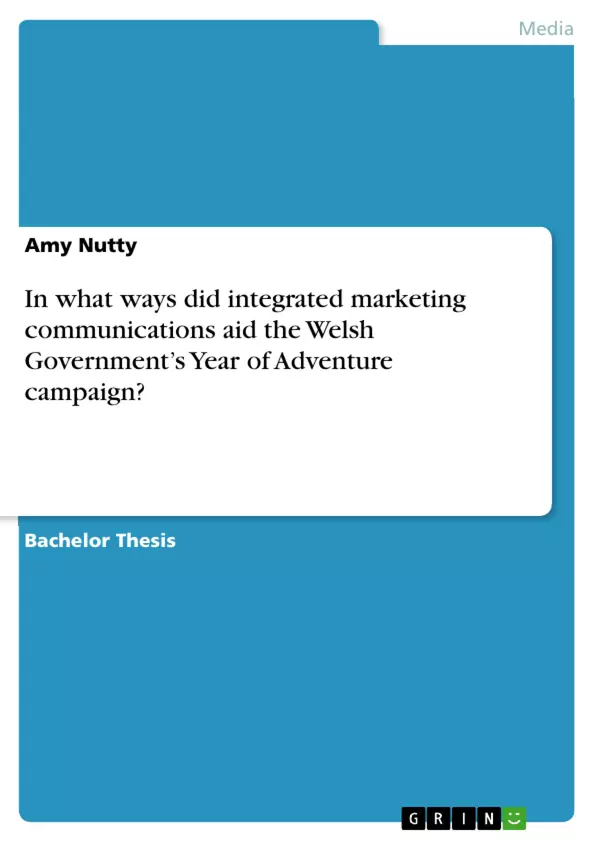This dissertation examines the promotional tools that were implemented during the 2016 Visit Wales marketing campaign, the Year of Adventure. Adopting a deductive approach, the thesis uses a combination of academic literature, paired with qualitative and quantitative research methodologies to evaluate the effectiveness of the three key devices, which include public relations, advertising and digital marketing. Despite the in-house research conducted by Visit Wales that concludes the rising tourism figures witnessed throughout 2016 provide evidence of the campaign’s success, a series of self-completion questionnaires and telephone interviews targeted at the Welsh accommodation sector and tourists themselves offer a more critical view, which challenges this ideology. This thesis provides a more transparent overview of the marketing communications tools implemented during the Year of Adventure, assessing their impact and potential influence within the Welsh tourism industry.
Inhaltsverzeichnis (Table of Contents)
- Introduction
- Year of Adventure: Marketing Communications Matrix
- Advertising
- Digital Marketing
- Public Relations
- Research Methodologies and Findings
- Quantitative Questionnaires
- Qualitative Interviews
- Conclusion
Zielsetzung und Themenschwerpunkte (Objectives and Key Themes)
This dissertation investigates the effectiveness of the Year of Adventure marketing campaign launched by Visit Wales in 2016. The primary goal is to assess the impact of the campaign on the Welsh tourism economy and its success in positioning Wales as a leading adventure tourism destination. This is achieved through the analysis of the campaign's promotional tools, including advertising, digital marketing, and public relations, and an examination of the feedback provided by both the accommodation sector and tourists.
- The role of integrated marketing communications in achieving campaign objectives.
- The effectiveness of different promotional tools in promoting Wales as an adventure tourism destination.
- The impact of the Year of Adventure campaign on tourism figures and visitor experiences.
- The relationship between the Welsh government, Visit Wales, and tourism stakeholders.
- The importance of branding and destination management in a competitive tourism market.
Zusammenfassung der Kapitel (Chapter Summaries)
The introduction provides an overview of the Welsh tourism landscape, highlighting the role of Visit Wales in promoting the country's destination image. It discusses the development of a seven-year strategy aimed at fostering sustainable tourism growth and the adoption of the marketing mix framework. The chapter concludes with a focus on the Year of Adventure campaign and its purpose in positioning Wales as a leading adventure destination.
The chapter titled "Year of Adventure: Marketing Communications Matrix" delves into the conceptual framework used to guide the campaign, exploring the use of integrated marketing communications to ensure a consistent message across various promotional tools. The chapter also analyzes the application of Booms and Bitner's extended framework, considering the people, physical evidence, and process involved in the campaign.
The following chapters examine each of the three key promotional tools employed in the Year of Adventure campaign: advertising, digital marketing, and public relations. These chapters explore the specific tactics implemented, their intended impact, and the challenges faced in execution. The discussion focuses on how these tools contribute to the overall goal of promoting Wales as an adventure tourism destination.
The chapter "Research Methodologies and Findings" presents the research approach employed in the dissertation. It outlines the use of both quantitative questionnaires and qualitative interviews to gather data from key stakeholders, including the accommodation sector and tourists. The chapter details the methodology used in data collection and analysis, providing insights into the findings obtained.
Schlüsselwörter (Keywords)
The dissertation explores the intersection of integrated marketing communications, destination management, and adventure tourism. Key concepts include the Year of Adventure campaign, Visit Wales, the Welsh tourism economy, promotional tools (advertising, digital marketing, public relations), stakeholder engagement, and the impact of marketing on destination branding.
Frequently Asked Questions
What was the "Year of Adventure" campaign?
The Year of Adventure was a 2016 marketing campaign by Visit Wales aimed at positioning Wales as a leading global destination for adventure tourism.
What promotional tools were analyzed in this dissertation?
The study focuses on three key devices: public relations, advertising, and digital marketing, and evaluates their individual and integrated effectiveness.
Was the campaign successful according to tourism stakeholders?
While Visit Wales reported rising tourism figures, research among Welsh accommodation providers and tourists suggests a more critical view of the campaign's actual influence.
What is the role of Integrated Marketing Communications (IMC)?
IMC ensures that all promotional tools convey a consistent and unified brand message across different channels to maximize the impact of the destination image.
What methodology was used to evaluate the campaign?
The dissertation used a deductive approach combining academic literature with qualitative interviews and quantitative questionnaires targeted at tourists and business owners.
- Quote paper
- Amy Nutty (Author), 2017, In what ways did integrated marketing communications aid the Welsh Government’s Year of Adventure campaign?, Munich, GRIN Verlag, https://www.grin.com/document/379626



